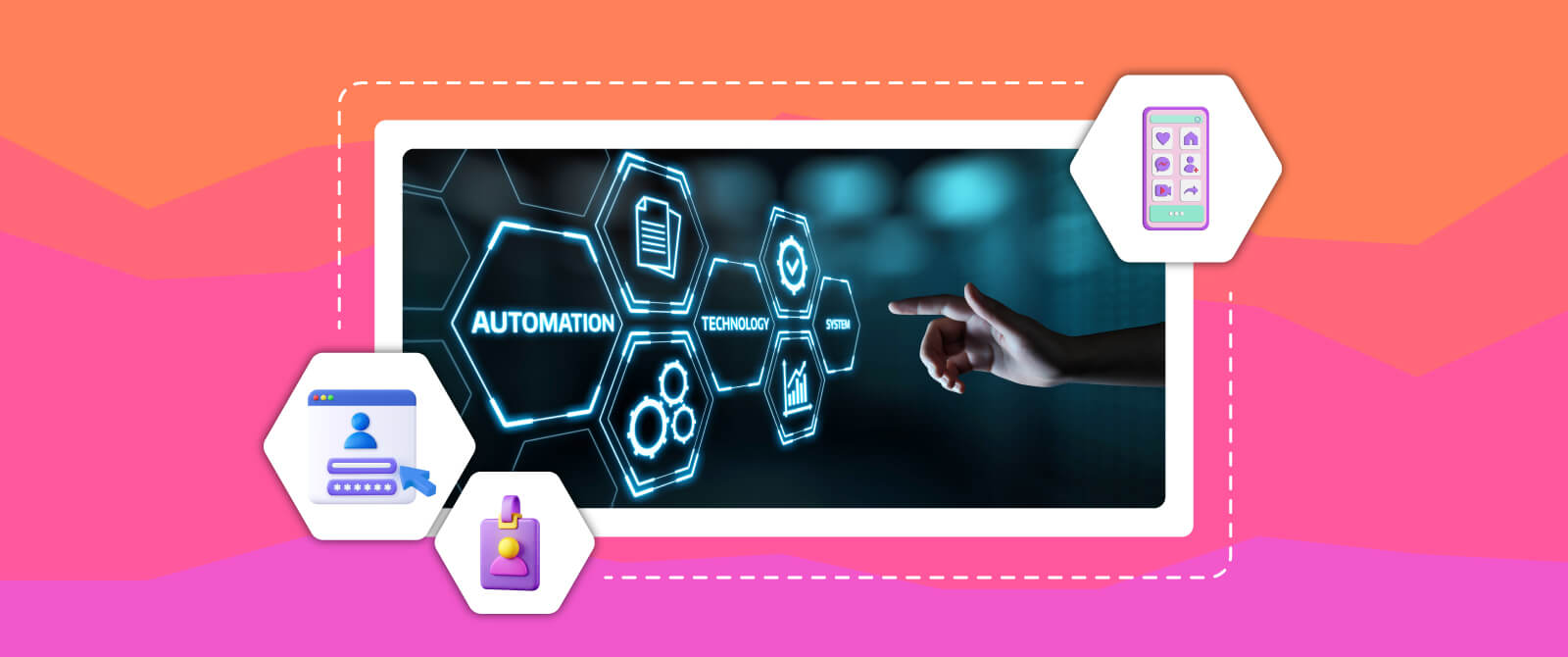Event preparation involves complex responsibilities beyond registration and tickets, such as communicating with guests and analyzing post-event data. Manually performing this task can be time-consuming and prone to errors. In terms of technology, event automation simplifies event procedures by eliminating their complexity.
Event automation platforms enable planners to increase productivity, improve the experience of attendees, and get insights into the success of their events.
This blog will cover:
What is an event automation platform, and how does it work
The role of event automation platforms
Key benefits of automating event processes
Best practices for successful implementation
Common challenges and how to overcome them
How to choose the right event automation platform
Table of Contents
1. What is Event Automation?
A technique and technology known as event automation automates the repetitive tasks involved in organizing and carrying out an event. Attendee involvement, marketing messaging, ticketing, registration, and data collecting are a few examples.
By eliminating the need for manual procedures, guaranteeing consistency and lowering errors, automation systems allow event planners to execute their events with little to no stress.

How Event Automation Works
Event automation integrates various processes into a single system, allowing for more efficient task execution.
Automated Registration and Ticketing: Including online forms, ticket generation, and payment options.
Automation of Email & SMS for reminders: Confirmations and follow-ups.
Chatbots and AI-Powered Support: Offering rapid assistance to guests.
Visitor Engagement and Automation: Help with personalized recommendations and push notifications.
Data Collection and Reporting: Real-time analytics for insights and events.
Automated workflows can minimize operational expenses and improve event management efficiency.
2. What is an Event Automation Platform?
An event automation platform is a platform that helps event planners better manage their events by integrating a variety of automation techniques into equipment. These solutions provide event planners with an integrated dashboard that allows them to track registrations, interact with attendees, and examine performance indicators.
Essential Elements of An Event Automation Platform:
Event Registration Platform: Using an online registration platform, attendees can easily sign up, pay, and receive confirmations.
CRM and Marketing Integrations: Syncs attendee data with CRM systems and marketing tools.
Email & SMS Campaign Automation: Schedule promotional programs and reminders.
Mobile Event Applications: Offer individualized content, scheduling, and networking possibilities.
Check-in and Access Management: Use QR codes, facial recognition, and RFID technology to ensure smooth access.
An event automation platform simplifies the entire event lifecycle, including planning, execution, and analysis.
3. Event Automation Benefits: Why It’s Essential for Event Success
Automating events makes managing them way easier and better. It enables organizers to simplify operations, engage more people, and make better use of resources in order to achieve their goals.
1. Saves Time and Effort
With automation taking care of tasks like ticketing, registration, and emails, event staff can spend more time engaging with attendees and planning the big picture. Since most scheduling issues are handled by these automated systems, it’s easier to stay organized and focus on what really matters.
2. Improves Attendee Experience
A great event starts with good guest management. Event platforms make it easy with automatic emails and texts, personalized content, and a simple check-in process. Features like self-check-in kiosks, digital badges, and quick notifications help everything run smoothly while keeping the vibe friendly and fun.
3. Enhances engagement and communication
AI-powered push notifications, chatbots, and ideas improve real-time communication in event automation solutions. These characteristics also facilitate effective onboarding programs. This strategy keeps attendees informed and engaged throughout the event, encouraging active participation. Automated surveys and feedback gathering enable continuing interaction after the event.
4. Delivers data-driven insights.
An event management platform with analytics and reporting tools allows organizers to assess the success of their events. Event organizers can monitor key metrics such as networking activity, session attendance, and engagement rates due to automation. With this information, marketing strategies can be further optimized, which will ultimately lead to even better events.

5. Decreases Costs and Boosts ROI
Event automation can reduce operating costs by eliminating human labor and enhancing efficiencies. Automation prevents overstaffing, paperwork, and duplicate jobs. Automation enhances event delivery and visitor experience, enhancing profitability and viability.
4. How to Use Event Automation for Maximum Impact
Event planners can optimize the advantages of event automation by using a methodical, systematic approach.
Step 1: Choose the Right Event Automation Platform
It’s critical to select an event automation platform with the appropriate functionality. Important things to think about are:
An interface that is easy to use.
Connect to already-existing technologies (payment gateways, marketing software, and CRM).
Both minor and major events scale.
Options for customization.
Capabilities for reporting and data analytics.
Step 2: Automate Registrations and Ticketing
Establish a system for online registration that offers:
Instantly create tickets and emails of confirmation.
Safe processing of payments
QR code-based mobile check-in
Step 3: Set Up Email and SMS Campaigns
Considerations for your automated workflows for SMS and email:
When registering, confirmation emails are issued.
Reminders for events and updates to the agenda
Following an event, thank-you notes and feedback questionnaires
Step 4: Link it to marketing and CRM tools
Combining the CRM and marketing technologies with the event automation platform to facilitate data flow and help with campaign creation.
Step 5: Support Attendees with AI-powered chatbots
AI can answer frequently asked questions by attendees, hence removing the need for human customer service.
Step 6: Utilize Post-Event Analytics
Future events can be optimized by collecting relevant data on session performance, participant behavior, and engagement levels.
5. Best Practices for Implementing Event Automation Successfully
The following best practices can be adopted by event planners to ensure successful execution:
Choose the Right Platform: Analyze the functionality, scalability, and compatibility of an event management platform with other event management platforms before deciding. Ensure it is suitable for your event’s purpose and needs.
Personalized Communication: Send messages, special offers, session suggestions, and reminders based on what attendees share. By breaking down the audience into smaller groups and sending the right message, automation tools can boost engagement.
Workflow Optimization: To fix any problems, thoroughly test your automated settings prior to the event. To ensure a seamless trip, test a variety of scenarios.
Consider the following key performance indicators: Keep an eye on the important metrics, including comments, conversion rates, engagement rates, and attendance rates. Use real-time analytics to inform your event planning and enhance future event automation.
Continuous Improvement: As part of your ongoing examination of each event to learn and improve, collect post-event analytics and attendee comments, pinpoint pain points for the next event, and automate as many processes in Recurrent Events and participants as you can.
6. Future of Event Automation: What’s Next?
The field of event automation is constantly evolving, with new time-saving technologies constantly emerging. Adopting innovations will help event professionals stay ahead of the curve in an increasingly digital environment. Among the new trends are:
AI & Machine Learning: Predicting guests’ behavior and automating personalized interactions
Contactless Check-In: Facial recognition technology allows you to get to the event faster and avoid the annoyance of standing in line.

Hybrid event automation: This brings both in-person and virtual event automation technologies to a single location. The usage of augmented reality (AR) and virtual reality (VR) to create immersive experiences for both virtual and physical audiences is increasing.
Smart Wearables for Smooth Interaction: RFID or NFC-enabled event badges and wristbands allow for cashless payments, convenient check-ins, and real-time participant tracking to improve engagement.
Automated Networking & Matchmaking: By bridging the gap between participants, AI-powered platforms may automatically match those with similar interests, ensuring that registrants make the most of the event’s networking opportunities.
7. Challenges of Event Automation and How to Overcome Them
Although event automation has some clear benefits, there are also some downsides.
Problems with Integration: Some platforms may charge to interface with pre-existing tools. It is critical to have a reliable, versatile platform with integration possibilities.
Learning Curve: Educating personnel on new automation solutions can take some time. Proper employee training eases the transition.
Budget Restrictions: Due to their price range, certain tools may be prohibitively expensive. Layer by layer, build that automation, and add more as needed.
Dangers of Over-Automation: Excessive mechanization may make interactions feel less intimate. Preserving the ideal balance of human connection and automation.
8. Choosing the Right Event Automation Platform for Your Needs
By speeding up the event booking process, event automation may enable venues to plan more events in less time, increasing revenue and efficiency. When selecting an event automation platform, consider the following factors:
Features and Functionality: Verify that the platform you select has the following essential features: networking tools, live polling, marketing automation, attendee engagement tools, registration, and real-time analytics.
CRM and Third-Party Integration: For a seamless experience, it should effortlessly link with backend systems like CRM, email marketing platforms, payment gateways, and virtual event platforms.
Scalability and Customization: A platform that can be scaled and tailored to fit a range of requirements, including white-label branding, for everything from local meetings to major conferences.
User Interface: Facilitating simple navigation and interaction is crucial for both organizers and participants.
Pricing & ROI: To guarantee cost-effectiveness, assess the available pricing models, the features that come with each, and the possible return on investment (ROI).
Conclusion
Automation is revolutionizing the event sector by enabling greater efficiency, improved attendee experiences, and new insights. All event planners are aware that they can maximize event success, smooth operations, and reduce expenses by utilizing an event automation platform.
The secret to long-term success for event planners wishing to implement automation may lie in selecting the appropriate platform and best practices.
FAQs
Event automation enhances engagement by providing personalized recommendations, real-time updates, and AI-powered chatbots for instant support. It ensures that attendees stay informed and have a seamless event experience.
Yes, event automation is scalable and can streamline processes for both small and large events. It helps reduce manual tasks, improve efficiency, and enhance attendee interactions, regardless of event size.
Some common mistakes include over-automation (leading to a lack of personal touch), failing to integrate platforms properly, neglecting attendee data security, and not testing automated workflows before the event.
Most event automation platforms follow strict security measures such as data encryption, GDPR compliance, and secure payment processing to protect attendee information. Choosing a trusted provider is essential.
Costs vary depending on the platform’s features, scalability, and integrations. Some platforms offer modular pricing, allowing event organizers to start small and expand automation features as needed.





















